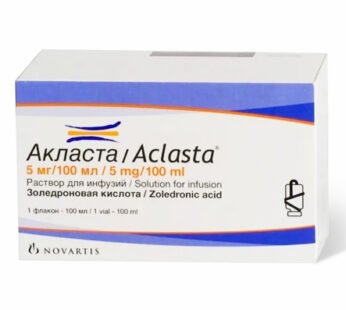Aprocin 500 mg

Description
Pharmacology Ciprofloxacin is a synthetic quinolone antibiotic with a broad spectrum of antibacterial activity. It is highly effective against most gram-negative aerobic bacteria, including Enterobacteriaceae and Pseudomonas aeruginosa. Ciprofloxacin also demonstrates activity against gram-positive aerobic bacteria, including both penicillinase-producing and non-penicillinase-producing staphylococci, as well as methicillin-resistant strains. However, many strains of streptococci exhibit relative resistance. The bactericidal effect of Ciprofloxacin results from its inhibition of the bacterial enzyme DNA gyrase, which is essential for bacterial DNA synthesis. After oral administration, Ciprofloxacin is rapidly and efficiently absorbed from the gastrointestinal tract and is widely distributed throughout body tissues and fluids. It has a half-life of approximately 3.5 hours, and 30-50% of the orally administered dose is excreted unchanged in the urine within 24 hours, along with biologically active metabolites.
Dosage The appropriate dosage of Ciprofloxacin depends on the severity and type of infection, the sensitivity of the causative organism, and the patient’s age, weight, and renal function.
Adults:
- General dose: 100-750 mg twice daily
- Lower and upper urinary tract infections (depending on severity): 250-500 mg twice daily
- Respiratory tract infections (upper and lower, depending on severity): 250-500 mg twice daily; for Streptococcus pneumoniae infections, 750 mg twice daily
- Gonorrhea: A single dose of 250 or 500 mg
- Most other infections: 500-750 mg twice daily
- Cystic fibrosis with pseudomonal lung infections: 750 mg twice daily, with body weight considered in dosage determination
- Impaired renal function: Dose adjustment is typically unnecessary unless renal impairment is severe (serum creatinine >265 micromol/L or creatinine clearance <20 mL/min). If needed, the total daily dose should be reduced by half, with serum drug level monitoring recommended.
- Elderly: No dosage adjustment required despite higher serum levels in elderly patients.
- Children and adolescents: Due to potential arthropathy in weight-bearing joints, Ciprofloxacin is not generally recommended for growing children and adolescents. However, in cases where benefits outweigh the risks, the dosage should be 7.5-15 mg/kg/day in two divided doses.
- Duration of treatment: Typically, 5-10 days, continuing for three days after symptoms disappear.
Extended-release tablet:
- Uncomplicated urinary tract infection (acute cystitis): 1000 mg once daily for three days.
Intravenous (IV) infusion dosage:
- Urinary Tract Infections: 200 mg every 12 hours (mild/moderate) or 400 mg every 12 hours (severe/complicated) for 7-14 days
- Lower Respiratory Tract Infections: 400 mg every 12 hours (mild/moderate) or 400 mg every 8 hours (severe/complicated) for 7-14 days
- Nosocomial Pneumonia: 400 mg every 8 hours for 10-14 days
- Skin and Soft Tissue Infections: 400 mg every 12 hours (mild/moderate) or 400 mg every 8 hours (severe/complicated) for 7-14 days
- Bone and Joint Infections: 400 mg every 12 hours (mild/moderate) or 400 mg every 8 hours (severe/complicated) for more than 4-6 weeks
- Complicated Intra-abdominal Infections: 400 mg every 12 hours for 7-14 days
- Acute Sinusitis: 400 mg every 12 hours for 10 days
- Chronic Bacterial Prostatitis: 400 mg every 12 hours for 28 days
Administration Instructions for IV Infusion
- Inspect the IV bag for leaks before use; discard if leaks or contamination are found.
- Do not use if the solution appears cloudy or contains precipitates.
- Avoid connecting multiple flexible IV bags in series.
- Follow proper aseptic techniques for infusion administration.
Drug Interactions
- Avoid taking Ciprofloxacin with magnesium- or aluminum-containing antacids, sucralfate, or calcium, iron, or zinc-containing products. These should be taken at least two hours after or six hours before Ciprofloxacin.
- Ciprofloxacin absorption is reduced when taken with milk or dairy products, though dietary calcium within meals does not significantly affect absorption.
Contraindications
- Patients with known hypersensitivity to Ciprofloxacin or other quinolones should not use this medication.
Side Effects
- Gastrointestinal: Nausea, diarrhea, vomiting, dyspepsia, and abdominal pain.
- Central Nervous System: Headache, dizziness, fatigue, confusion, seizures, and rare cases of retinal detachment.
- Hypersensitivity Reactions: Rash (rarely Stevens-Johnson syndrome or toxic epidermal necrolysis), pruritus, and systemic allergic responses.
- Other Effects: Joint pain, mild photosensitivity, transient liver enzyme elevations (especially in those with preexisting liver conditions), increased bilirubin, urea, or creatinine levels, risk of hypoglycemia, and potential mental health effects.
Pregnancy & Lactation
- Animal studies have shown no teratogenic effects, but Ciprofloxacin has been associated with arthropathy in immature animals, so its use during pregnancy is not advised.
- Ciprofloxacin is excreted in breast milk; therefore, it is not recommended for nursing mothers.
Precautions & Warnings
- Use with caution in patients with CNS disorders such as arteriosclerosis, epilepsy, or conditions predisposing to seizures.
- Maintain adequate hydration while taking Ciprofloxacin.
- Avoid concurrent use with antacids, sucralfate, and mineral supplements containing calcium, iron, or zinc, as they can reduce drug absorption.
- Ciprofloxacin should not be taken with milk or yogurt alone, as absorption may be significantly affected.
Use in Special Populations
- While Ciprofloxacin has been effective in pediatric clinical trials, it is not a first-choice drug for children.
Overdose Effects
- Overdose symptoms may include seizures, hallucinations, confusion, gastrointestinal discomfort, renal or hepatic impairment, crystalluria, hematuria, and reversible renal toxicity.
Therapeutic Class
- 4-Quinolone antibiotics
- Antimicrobial agents for diarrhea
Storage Conditions
- Store below 30°C, protected from light and moisture.
- Keep out of reach of children.
Additional information
| Weight | 0.15 g |
|---|






Reviews
There are no reviews yet.